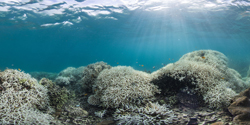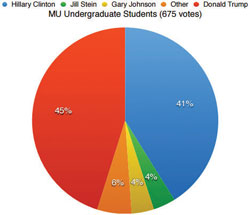President Donald Trump nominated Kathleen Hartnett-White as Head of the White House Council on Environment Quality – a decision that must be confirmed by the Senate.
While Hartnett-White’s appointment is partially justifiable – she was previously a chairman of the Texas Commission on Environmental Quality, and was considered for Scott Pruitt’s position as head of the Environmental Protection Agency – environmental advocates shake their heads at the choice.
According to one CNN report, Trump’s nominee was quoted in 2016 as saying that the belief in “global warming” is a “kind of paganism” for “secular elites.” Hartnett-White has also called carbon dioxide “the gas of life on this planet.”
Her ideologies predictably align with the Trump administration’s assertions that climate change is not human-caused, and also questions scientific accord on the topic.
Hartnett-White would oversee environmental and energy related policies throughout the government if granted head of the Council on Environmental Quality.
According to the Washington Post, Hartnett-White questioned the findings of the Intergovernmental Panel on Climate Change, which is a group of “gold standard” scientists who volunteer to conduct research.
In discussing the importance of tackling climate change, she said this to the Washington Post: “I am not at all persuaded by the IPCC science that we are standing on some precipice. We’re not standing on a cliff from which we are about to fall off.”
Previously, while a senior fellow at the Texas Public Policy Foundation, Hartnett-White criticized the 2007 Supreme Court decision that the Clean Air Act can regulate carbon dioxide, among an assortment of other greenhouse gases, for being pollutants.
The board of directors of the Texas Public Policy Foundation is largely made up of executives in the oil industry, as well as GOP activists. One of the group’s first donors was the oil-based conglomerate Koch Industries, reported the Washington Post.
Should Hartnett-White be accepted to the post, she would work with EPA head Scott Pruitt and other Trump officials who have expressed criticism of climate change and regulations to curb it.
The nominee has also professed several critical assessments in regards to accepted climate change findings during a Senate meeting on Environmental and Public Works. Among these assertions is that the extent to which humans have contributed to climate change is uncertain, and that she wouldn’t depend on scientists for that answer. Stephen Chapman, Ph.D., an associate professor of political science, considers the repercussions of Hartnett-White’s appointment and beliefs: “This would definitely have major impacts on environmental policy throughout the country. Specifically, [her] position as chair of the Council on Environmental Quality would oversee federal environment policy for all government actions. This has become important in recent months with the Trump administration’s decision of carving away national parks and other federal lands as what they would want to do with that land is subject to the approval of the CEQ.”
“On a larger scale, Hartnett-White’s denial of the scientific process is more troubling. Science is about taking all evidence into account, not only the evidence that aligns with a particular viewpoint. Hartnett-White repeatedly cherry-picked or misrepresented evidence in her writings and confirmation hearing. This is a dangerous approach in the era of fake news – science is a collective process to uncover knowledge about our world and dismissing this process because it does not fit a particular agenda has negative consequences for society.”
Jason Adolf, Ph.D., associate professor of marine science, similarly expresses concerns about Hartnett-White’s nomination, as well as her knowledge on climate change. On her conclusion that there is a “difference of opinions” and “not one right answer” in regards to whether excess greenhouse emission captured by the ocean is more or less than 50 percent, Adolf said “This seems like the same old climate change denial ploy that has been used for a long time – paint a false picture of uncertainty and disagreement among scientists who (unlike Hartnett) spend a lot of time studying the issue and are in fact overwhelmingly in agreement. The implication of the top environmental advisor holding these opinions is that the president will hear that ‘no problem exists’ regarding climate change issues. It also spreads to the general public when a person of her positions and influences makes misleading statements like that.”
During the Senate meeting, Hartnett-White also eventually conceded, “I do not have any kind of expertise or even much laymen’s study of the ocean dynamics and the climate change issues.”
“Hartnett seems to hold a lot of opinions on the science of climate change for a person who admittedly has little experience with it and an educational background that is not in a scientific field,” Dr. Adolf said. “I can’t imagine why a person such as Hartnett who, by her own admission, doesn’t have the scientific background or experience to understand the issues involving oceans and climate change would be appointed to (or want to be) the top environmental advisor to the President.”
Dr. Chapman agrees. “This has been a larger theme of the Trump administration as many of his nominees in science-based positions has little to no formal training. For example, Sam Clovis was nominated to be the lead scientist for the Dept. of Agriculture who has no formal natural sciences training. This aligns with Scott Pruitt, the head administrator of the EPA, as his training is mainly in law and business and actually disbanded the Oklahoma environmental protection agency as Attorney General for OK. Rick Perry, head of the Department of Energy, when campaigning for president in 2012, said he would eliminate the very department he now heads. This is clearly a strategic tactic of the Trump administration to do away with as many environmental protections as possible.”
Marco Palladino, a senior political science student at Monmouth, said, “Trump’s top environmental advisor is dangerously unaware of global environmental problems. This is a high office…and she appears to lack basic environmental science you learn here in a Global Sustainability class. The problems we are facing are real and if we continue to see this astounding level of ignorance, it means people at Monmouth and around the country need to step up to fight climate change.”




